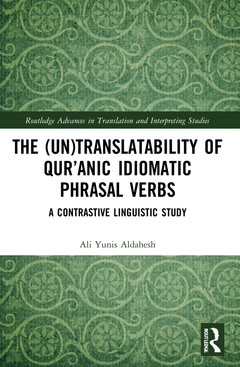The (Un)Translatability of Qur’anic Idiomatic Phrasal Verbs A Contrastive Linguistic Study Routledge Advances in Translation and Interpreting Studies Series

Qur?anic idiomaticity, in its all aspects, poses a great deal of challenge to Qur?an readers, learners, commentators, and translators. One of the most challenging aspects of Qur?anic idiomaticity is Qur?anic idiomatic phrasal verbs, where significances of proper Arabic verbs are entirely fused with significances of prepositions following them to produce new significances that have nothing to do with the basic significances of those verbs and prepositions.
By examining a corpus of ten of the most influential English translations of the Qur?an, this study scrutinizes how some translators of the Qur?an have dealt with the phenomenon of Qur?anic idiomatic phrasal verbs, the difficulties that they have encountered when translating them into English, and the strategies that they have employed in their attempts to overcome the inherent ambiguity of such expressions and provide their functional-pragmatic equivalents for English readership.
The study proposes a working model for analysing and assessing the translation of the Qur?anic idiomatic phrasal verbs and provides a number of theory-based recommendations for translators in general and Qur?an translators in particular.
- Introduction
- (Un)Translatability Of The Qur’an: A Theoretical Perspective
- Pinning Down The Phenomenon Of Idiomatic Phrasal Verbs In Arabic Language
- Qur’anic Idiomatic Phrasal Verbs
- Research Methodology
- Qualitative Data Analysis, Assessment, And Discussion
- Conclusion
Ali Yunis Aldahesh is a lecturer in Arabic language, literature, and culture at the University of Sydney, Department of Arabic Language and Cultures, School of Languages and Cultures, Faculty of Arts and Social Sciences. He holds a PhD in translation and linguistics, an MA in translation and linguistics, and an MA in Semitic studies. Dr Aldahesh’s area of research interest is translation and linguistics, with a special emphasis on the language, text, and translation of the Qur’an. His published works include English Translations of the Qur’an: A Descriptive Comparative Study in their Aspects of Disagreement (2020), The Concept of Taqwa in the Holy Qur’an as Understood by Muslim Commentators (2010), and Translating Idiomatic English Phrasal Verbs into Arabic: A Contrastive Linguistic Study (2009).
Date de parution : 01-2023
15.6x23.4 cm
Date de parution : 07-2021
15.6x23.4 cm
Thèmes de The (Un)Translatability of Qur’anic Idiomatic Phrasal... :
Mots-clés :
Abdel Haleem; Quranic Translators; Idiomatic Phrasal Verbs; QIPV; Arabic Language; proper arabic verbs; Arabic; Corpus of english translation; Arabic Prepositions; Contrastive Analysis Approach; Translation studies; Marked Word Orders; Conversational Implicatures; Quran; Erroneous Errors; Quranic Studies; Expressive Levels; Tertium Comparationis; Indirect Speech Acts; Intransitive; Intransitive Verb; Denotative Meaning; Direct Speech Acts; Connotative Meaning; English Grammar; Locutionary Act; Translation Quality Assessment; Translation Text; Contrastive Analysis; Parenthetical Glosses; Illocutionary Force; Arabic Verbs



